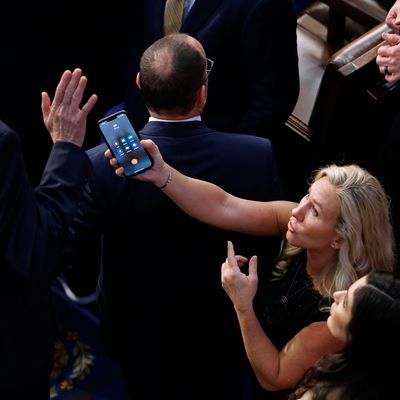
As House Republicans battled through 15 votes over whether Kevin McCarthy would be allowed to become Speaker, New York Times columnist Ross Douthat was hardly the only observer who was reminded of the tea-party movement. That makes sense, as the House Freedom Caucus, from whence the rebellion against McCarthy emanated, is a product of the Obama-era movement, with its characteristic fiscal extremism, obstructionism, and overweening self-righteousness.
But where Douthat went awry was in drawing a bright line between the tea-party movement and Trumpism. He suggested this week that the battle over the Speakership might reflect a regressive moment in which Trumpism is fading away and the GOP is returning to what it was before the 45th president came down that escalator at Trump Tower and began his improbable ascent to power. Douthat wrote:
The failure of the “red wave” in the 2022 midterms and Trump’s subsequent diminishment have had a reverse-wave effect: It’s like watching a wall of water roll backward, exposing the old coastline, the political topography that the water covered up. Kevin McCarthy’s embarrassing struggle to claim the speakership, and the week of chaos in the House of Representatives, don’t properly belong to the Trump era. It’s the old world come again, the G.O.P. ancien regime with all its dysfunctions, stalemates and futility.
What distinguishes Douthat’s take from the sort of wishful thinking about the death of Trumpism we often see in the punditocracy is his recognition that, in some respects, Donald Trump saved his party from a lot of its prior excesses (while, of course, saddling it with many of his own):
Part of Trump’s original success rested on the way he freed the Republican Party … by resolutely refusing to campaign on the True Conservative™ catechism and elevating issues that mattered more to less-ideological conservatives and swing voters. He did all this in a demagogic style, but his promises — to bring back jobs lost to China and build new highways, to protect Social Security while ending illegal immigration — helped the G.O.P. slip out of its Obama-era trap, where the congressional party appeared to be obsessed with unpopular spending cuts but also was rarely capable of driving any bargains to achieve them.
One of Trump’s true gifts to his party was a recognition of what the Republican voting coalition, which is increasingly dominated by white working-class voters rather than quasi-libertarians, actually shares with a decent number of swing voters. From this perspective, the House GOP’s return to what Douthat calls “performative gestures and fiscal apocalypticism” is a rejection of Trumpism. Can today’s Republicans, he wonders, avoid tossing the healthy MAGA baby out with the bathwater?
It’s an interesting thought, but it relies on the false presumption that Trump was a proponent of fiscal sanity. It’s true that unlike many tea-partiers, he didn’t campaign in 2016 on promises to shut down the government if he didn’t get his way. And in contrast to Paul Ryan and his ilk, Trump didn’t seem to relish austerity policies as a moral scourge for a sinful nation. But he wasn’t exactly a latter-day Santa Claus. His persistent yet ultimately failed effort to kill Obamacare, which included provisions to end Medicaid as we have known it, was as churlish as anything the tea party proposed. And he personally triggered the last major federal-government shutdown late in 2018 out of pique over Congress’s failure to prioritize his precious border wall.
Perhaps more importantly, the minute Trump left office (and could no longer take credit for popular federal expenditures), he became as hardcore an opponent of “excessive” federal spending as Representatives Chip Roy or Bob Good. He has raged constantly at Senate Republican Leader Mitch McConnell for his perfidious cooperation with Democratic funding schemes — including the 2021 infrastructure bill. And no one in the House Freedom Caucus attacked the FY 2023 omnibus appropriations bill — the $1.7 trillion “monstrosity” that McCarthy’s critics have made extraordinary demands to reverse — more consistently than Trump, who called it a “disaster for our country” that “every single Republican” should oppose.
The House Republican Caucus is still more Trumpy than tea party-ish. Just look at the leading role the former president’s acolytes played on both sides of the Speakership drama. Bitter-ender Matt Gaetz twice voted for Trump to become Speaker. His fellow “Never Kevin” Lauren Boebert recently attacked top McCarthy defender Marjorie Taylor Greene for not joining her in an immediate endorsement of Trump’s 2024 presidential candidacy. And MTG, of course, helped seal the Speakership deal; the ex-president himself lobbied Gaetz and Matt Rosendale via her cell phone to let “my Kevin” have his gavel.
In many ways what we are seeing in the House is the tea-party movement re-baptized in Trump’s waters of rage, presenting right-wing partisanship as a crusade that it identifies with patriotism itself. Back in September, New York’s Ross Barkan predicted: “If the tea party was rightfully derided as a hard-right, recalcitrant bloc with no serious interest in governing, the 2023 House Republican majority could make that era of instability seem almost quaint in comparison.” The GOP majority is off to a good start in fulfilling that prophecy. And Trump — along with rivals for the MAGA mantle like Ron DeSantis — will do everything within their power to make it worse.
More on Politics
- The Mayorkas Impeachment Trial Was a Joke
- The ‘Uniparty’ Delusion Shared by MTG and RFK Jr.
- Bob Menendez’s Possible Legal Defense: My Wife Did It!






























